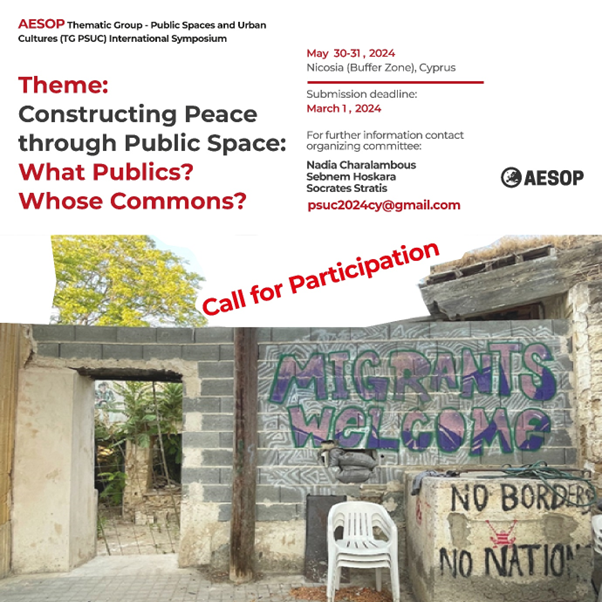The report following this symposium is available here.
The fifth event of the two-year period 2022-2024 on the working theme ‘Public Spaces, Urban Cultures, and Constructing Peace’ will take place in Nicosia, Cyprus on 30 and 31 May 2024. It will be an in-presence symposium entitled ‘Constructing Peace through Public Space: What publics? Whose commons?’ The symposium will be organized at the Goethe Institute and Home for Cooperation in the Buffer Zone of Nicosia, Cyprus.

Aim of the Symposium
The symposium aims to examine the relationships between the publics and peace-building processes in contested cities, with the intention to answer the following questions:
- How do we create spaces for conciliation to transform conflicts constructively?
- How does the active agency of the urban environment support or cancel out conciliation processes?
- Should public space be taken for granted, or should it be part of creating common ground in deeply divided societies?
- What is the role of civil societies and bottom-up initiatives?
- How do commoning practices support the diversity of publics in peacebuilding and related planning processes?
- Can urban challenges of common concern regarding social-ecological transformations (climate and other crises) trigger such commoning practices, and how?
Why Cyprus?
The location of Cyprus in the Eastern Mediterranean offers a unique venue at the confluence of three continents and a multitude of cultures that face such unique challenges. Many of these challenges are the result of not only long-standing local issues but also of issues that have emanated from recent conflicts in the surrounding region. The island in general and Nicosia, a divided European capital with a prolonged history of conflict, internal refugees' displacements, migration and tourist flows, economic fluctuations, and rapid, often abrupt urban transformations, serve as an ideal laboratory to explore, unravel, and question public space development in unstable and contested contexts. The local urban context provides a valuable case study and can unveil the complexity of all the factors that condition the various forms of public space in contemporary contested, continuously transformed contexts.
The Symposium Format
The Cyprus symposium comprises two-day activities that bring together scholars, activists, and spatial practitioners who deal with peacebuilding and conflict transformation through spatial measures. It is organized in roundtable workshops that will summon diverse participants who will share their work based on the above-mentioned questions. The layout of the roundtable workshops aims to foster constructive discussion and exchange among the participants. Some workshops will be ambulant, exposing the participants to the Nicosia contested context. Thus, the participation format will be open to encourage a diversity of means and ends to populate the roundtable debates.
Who can Participate?
Scholars, activists, and spatial practitioners who deal with peacebuilding and conflict transformation through public space and material practices are invited to participate.
Format of Participation
Short interventions in the form of oral presentations or videos (10-15 minutes).
Submissions
A submission including the title, authors' names, authors' affiliation and email address, 3-5 keywords, an abstract of max 200 words, and max 4 images (JPEG 300 dpi as separate files) and captions should be sent to the following e-mail address:
Important Dates
- 2 February 2024 Open call for participation
- 1 March 2024 Deadline for participation interests
- 8 March 2024 Participation approvals
- 1 May 2024 Program announcement Symposium
- 30-31 May 2024 Symposium
- 1 July 2024 Submission of full papers
- September 2024 Publication
Publications
The symposium findings, including all presentations and discussions during the symposium, will be published online following the event. The book of abstracts will also be published pre-symposium. Both publications will have ISBNs.
Scientific Committee
Evangelia Athanassiou, Nadia Charalambous, Sabine Knierbein, Sebnem Hoskara, Socrates Stratis

